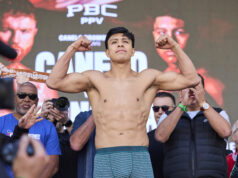“The Good Son,” an online preview of which I watched Saturday evening, froze two times at its 35-minute mark. The first time I rose from my sofa and casually refreshed the page, thinking little of the inconvenience. But the second time I felt something like anxiety, an actual discontent at the possibility I might not finish the movie, and when relief followed the video stream’s return, it became apparent I was watching something quite a bit better than I was prepared for.
“The Good Son,” a documentary about Ray Mancini and his father and Deuk-Koo Kim and his son, a movie based on Mark Kriegel’s acclaimed 2012 book of the same title, is excellent – better textured than most contemporary documentaries, and considerably more affecting than what “documentaries” HBO and Showtime often use to promote our sport. That is because of Mancini, a man whose physical stature is slighter, and whose humanity is larger, than most likely remember them. One forgets that Mancini, after making the cognomen “Boom Boom” nearly ubiquitous as “Sugar,” was retired before his 25th birthday, after his second loss to Livingstone Bramble, in 1985 – with a nonstarter decision loss to the late Hector Camacho four years later and a hopeless knockout loss to Greg Haugen three years after that.
There is another loss on Mancini’s ledger, of course, and “The Good Son” employs a bit of nimble footwork to avoid it. That loss was Mancini’s first, when he was stopped in the 14th round of his 1981 challenge for the late Alexis Arguello’s WBC lightweight title – when, seven months before becoming WBA lightweight champion, Mancini was shown to be only a very good and inordinately willful fighter and not a talent great as Arguello’s.
A theme of the movie’s second third, one that feels assembled by a publicity team more than its otherwise serious collaborators, goes something like: “Ray ‘Boom Boom’ Mancini had it all and was poised to have it all – and have it all! – if he could just get past one hardscrabble case from South Korea, an anonymous fighter from humble beginnings named Deuk-Koo Kim. But their fight would change everything.” Whatever veracity this claim has gets an assist from Bob Arum, who promoted Mancini and performs with magical authority before the camera, equal parts age and intelligence and presence, informing us that in 1982 this lightweight prodigy from Youngstown, Ohio, was on the precipice of overwhelming every limit of national consciousness previously imposed on prizefighters. This claim is best appreciated in the absence of Mancini’s having been stopped by Arguello in 1981, and in the absence of Arum’s having made even more outlandish claims 25 years later about a different prodigy from Youngstown.
There, if one wishes for criticisms of this documentary, that is about the extent of them. The movie is wonderful, otherwise. There is an appropriately rusty hue to most of the film, especially those parts that deal in Mancini’s hometown, an orange-peel underlayer everywhere; even the faded newspaper clippings feel more reddish amber than yellowish gray.
A reason to watch this movie even if you’ve read the book: An unlikely reunion between Kim’s son, Ji Wan, born months after his father died from wounds suffered in a Las Vegas prizefighting ring, and Mancini, the man whose honest pursuit of a brutal craft caused the death of Ji Wan’s father. There is perhaps more use of the word “closure” than purists will enjoy, but the scenes that fill the final third of “The Good Son” are touching and genuine.
Genuineness is a quality quite routinely sacrificed at the altar of reality; today, everyone is an actor, a person who absorbs lines written by others until he is able to deliver them like his identity depends on it, and all the more passionately with a recording device in the vicinity. Mancini has long pursued and at times enjoyed an acting career, but he appears to have left his craftsmanship elsewhere as he invites the son and fiancée of Deuk-Koo Kim to meet his family and eat at his dinner table.
Ji Wan is there in part to learn about his father through the man who caused his death and in part to forgive Mancini for all that followed – Ji Wan’s paternal grandmother, Deuk-Koo’s mother, committed suicide shortly after her son was removed from his life-support system in a Nevada hospital – but Ji Wan botches the forgiveness line in a way that proves he did not have it read to him for rehearsal in English on the way to the Mancini home. As Mancini sits at the head of his table and tries to say something poignant enough to bring solace, and is unable to, because he was a professional fighter raised by a professional fighter not someone whose first love was timely rhetorical devices, it reminds one of life’s myriad of unfairnesses, beginning with the way Mancini’s image acquired a demonic pall for anyone not already familiar with the jeopardies he and Kim freely chose to confront as prizefighters – the way television worked 30 years ago, and the way boxing was accessible enough for an eight-year old to happen on such a world title fight accidentally, as I recall doing.
All that changed ineradicably enough in short time, and some of it was attributable to the matter – truthful but inaccurate – of Americans watching a man gradually beaten to death on national television one Saturday afternoon in November. Deuk-Koo Kim deserved a better fate than what befell him, certainly, but so did Ray Mancini, and this movie is an excellent reminder of it.
Bart Barry can be reached at bart.barrys.email (at) gmail.com






